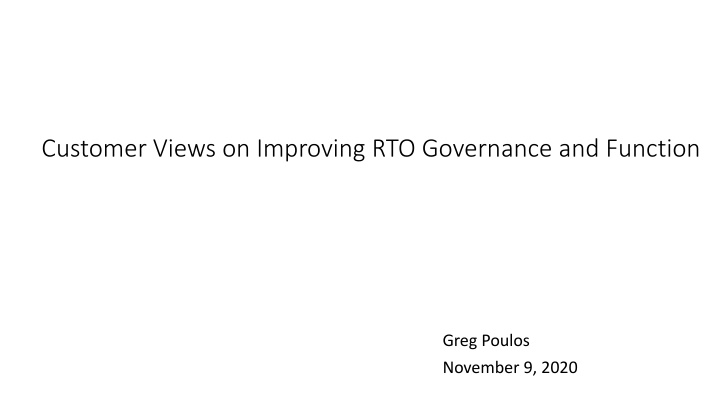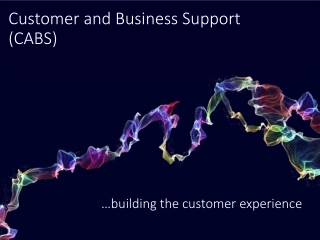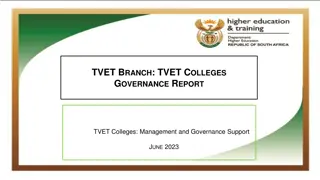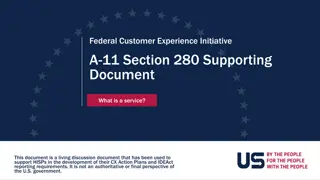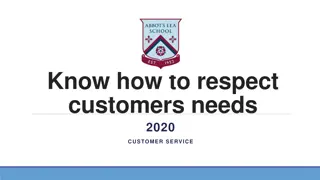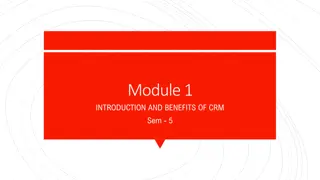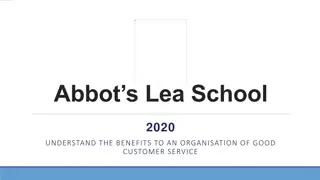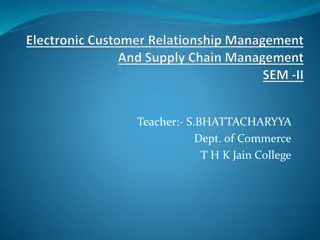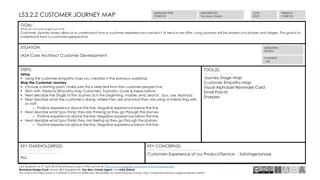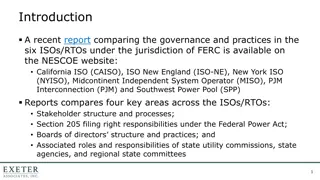Customer Views on Improving RTO Governance and Function Cost
This content delves into customer perspectives on enhancing RTO governance and understanding cost causation to benefit stakeholders. It presents insights shared by A. Greg Poulos on November 9, 2020, related to governance strategies and financial implications within RTOs.
Download Presentation

Please find below an Image/Link to download the presentation.
The content on the website is provided AS IS for your information and personal use only. It may not be sold, licensed, or shared on other websites without obtaining consent from the author.If you encounter any issues during the download, it is possible that the publisher has removed the file from their server.
You are allowed to download the files provided on this website for personal or commercial use, subject to the condition that they are used lawfully. All files are the property of their respective owners.
The content on the website is provided AS IS for your information and personal use only. It may not be sold, licensed, or shared on other websites without obtaining consent from the author.
E N D
Presentation Transcript
Customer Views on Improving RTO Governance and Function Cost Causation & Beneficiary A Greg Poulos November 9, 2020
Keys to Effective RTO Governance* Transmission Owners are voluntary members of RTOs. timeframes around membership; (e.g. significant exit fees) Establish some specific requirements and Tie incentives/adders for RTOs and transmission owners to documented benefits for consumers. Potentially, require that corporate RTO goals/compensation benefits align with benefits for consumers; Establish stable funding mechanisms for consumer advocate organizations to participate in stakeholder processes at the RTOs; Make consideration of the reasonableness of costs part of the RTO s mission; Ensure that burdens of proof are appropriately aligned with consumer interests. For example, the burden of proof should be on the RTO and TOs - not on consumers; Require at least one member of each RTO Board be a representative of [direct] consumer interests; Ensure that RTO workforce is diverse across all aspects including work experience, race, gender, etc. *The bullet points on these pages are still in draft form and they are my personal perspective! 2
Keys Continued Explore ways to minimize administrative rule changes and maximize competition in RTOs and resist efforts to direct the market results to non-competitive outcomes; Mandate effective and independent market monitoring in all RTOs; Initiate efforts to increase transparency and consumer participation at FERC; Establish metrics (or methods) to evaluate and verify the independence of RTOs; Establish expected levels of accountability and oversight from each RTO as a quasi-regulatory body. For example, establish robust measurement and verification expectations to assess whether actions achieved the desired outcomes; Review voting and/or membership structures to ensure that retail customers have appropriate say; Board meetings should be public and available to stream remotely; RTO mission statements should include a statement how their actions ultimately affect consumer prices; and RTOs should strongly consider term limits for CEOs and board members. 3
The 16 Member Offices of CAPS The 16 Member Offices of CAPS Delaware Division of the Public Advocate District of Columbia Office of the People s Counsel Illinois Citizens Utility Board Office of the IL AG (Public Utilities Bureau) Indiana Office of Utility Consumer Counselor Kentucky Office of Rate Intervention Maryland Office of People s Counsel Michigan Michigan Department of Attorney General New Jersey Division of Rate Counsel North Carolina Office of Attorney General, Utilities Section Public Staff North Carolina Utilities Comm. Ohio Office of the Ohio Consumers Counsel Pennsylvania Office of the Consumer Advocate Tennessee Office of the Tennessee Attorney General - Consumer Advocate & Protection Division Virginia Office of the Attorney General Insurance & Utilities Reg. Section West Virginia Consumer Advocate Division 4
Who We Are Established in 2013, Consumer Advocates of the PJM States, Inc., (CAPS) is a nonprofit organization whose members represent over 61-million consumers in the 13 PJM states and the District of Columbia. Regulatory rules vary greatly across our jurisdictions, but in each the electricity costs paid by consumers is at least partly determined by the tariff and rules under which PJM operates. PJM and its stakeholders set those rules and CAPS engagement is necessary to ensure that consumers voices are heard. What is CAPS? Mission Our mission is to actively engage in the PJM stakeholder process and at the Federal Energy Regulatory Commission to ensure that the prices we pay for reliable, wholesale electric service are reasonable. 5
Contact information Greg Poulos, Executive Director, CAPS Phone: 614-507-7377 E-mail: poulos@pjm-advocates.org 6
